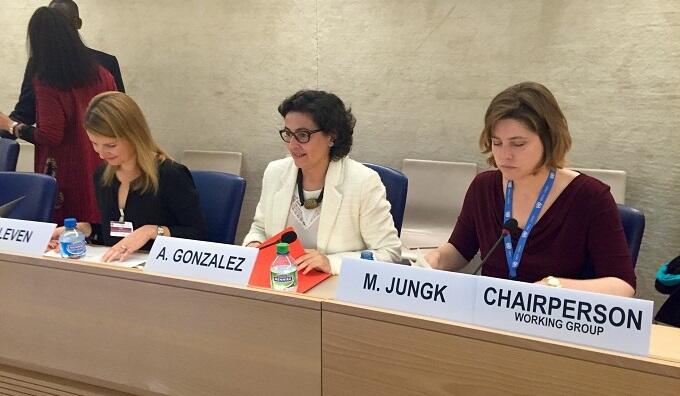
Statement by ITC Executive Director at the High-Level Closing Plenary of 2015 Business and Human Rights Forum (en)
Geneva - 18 November 2015
High Commissioner for Human Rights Zeid Ra'ad Al Hussein
Ladies and Gentlemen
Thank you for inviting the International Trade Centre (ITC) to be part of this important dialogue on business and human rights. You have asked that I speak about the need for better coherence between the trading system and human rights. ITC, as the joint agency of the World Trade Organisation and the United Nations is a clear example of how trade can be used to support poverty reduction around the world and achieve human rights.
Trade can sometimes be a contentious word in the human rights field. But I am here to tell you that there does not have to be any contradiction between trade and human rights. The principles and values underlying the trading system and the WTO are also the bedrock of human rights: openness and transparency; non-discrimination; rule of law.
What can be done to foster greater coherence between the two?
I would offer three suggestions:
1. More trade in human rights
2. More human rights in trade
3. Ensure that human rights is seen as central to the business case of companies
More trade in human rights.
Trade can help advance human rights. Trade offers opportunities to economically empower women. Trade helps lift populations living under extreme poverty. Trade helps connect SMEs to formal markets. And when we talk about business and human rights let's not forget that more than 98% of businesses are SMEs. The principles are also theirs. Trade can also help generate jobs for the youth. In a nutshell trade can help us end extreme poverty. And let's not forget that extreme poverty is the greatest negation of human rights.
More human rights in trade.
But we must be clear that it cannot be trade at any cost. That it cannot be any trade. We cannot accept trade agreements which undermine labour or environmental standards. We cannot accept value chains where human trafficking or new forms of slavery exist.
We can also use trade to foster the fight against corruption, as the EU has suggested in its new trade strategy. We can use trade to protect wildlife as we have seen in the recently concluded Trans Pacific Partnership.
Finally it has to be about ensuring that trade agreements work on the ground and that they are implemented and supportive of this.
Human rights at the heart of business strategies.
Third, human rights must be placed at the heart of business strategies. This applies to cross-border conglomerates, SMEs and mom and pop stores. The depth and the reach may be different but the precepts should be the same. Human rights should not remain as a stakeholder or ethical issue. This is increasingly becoming a market necessity. The consumer of today is better informed and more aware. They are watching. They have access to information. And they are increasingly caring about where they buy their goods and services and how companies source along the value chain. Today’s consumers, the growing middle class around the world, are much less tolerant of human rights abuses or gender inequality. They care about whether the small farmers in the supply chain are provided enough income for their output. And so too must business.
But the trade and human rights community have to assist the business community. There is a growing proliferation of human rights standards for businesses. This is challenging for even the larger ones- imagine then the impact on the smallest. We must ensure that standards are rationalised and be attainable rather than just aspirational.
We must improve transparency and this means investing in the traceability of value chains. We should remove the fear of knowing. There is a saying that goes 'what you don't know, you don't care about. But once you know you cannot but care'.
This is why ITC, together with the UN Global Compact and Global Standards One (GS1) have come together to launch the Blue Number Initiative. This Initiative is an open global online registry to which farmers and suppliers can sign up to be provided with a unique identification number. This is a tool to promote transparency, traceability and a rights based approach to sourcing and development. This is a concrete contribution to ensure more coherence between trade and human rights.
Thank you once again for inviting ITC to be a part of this important debate.



